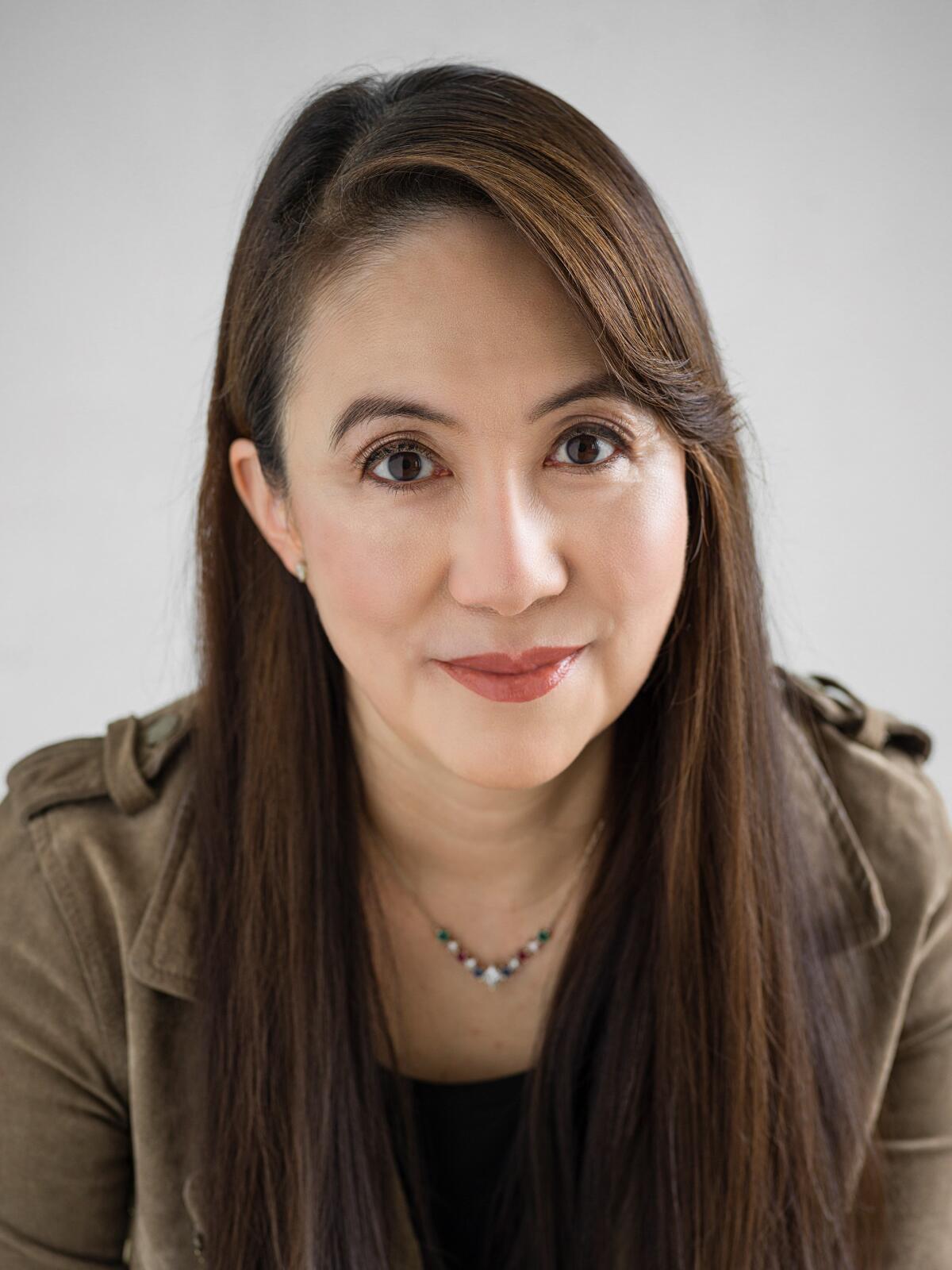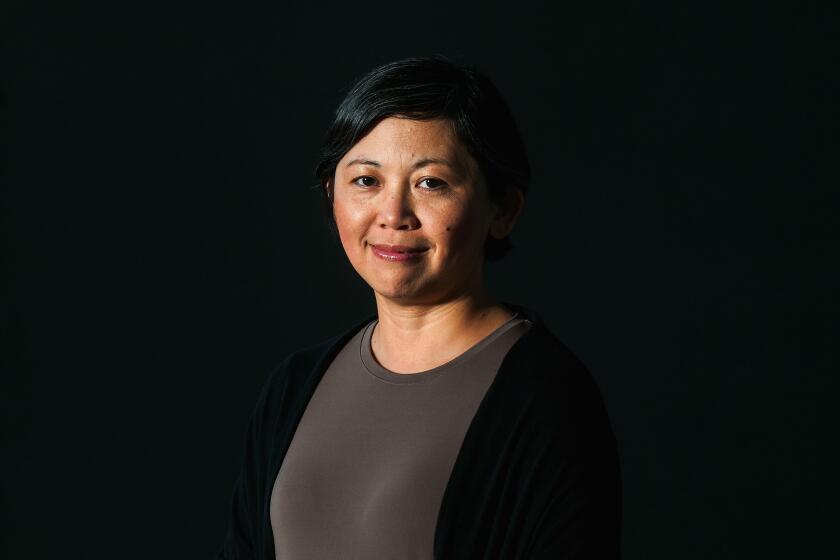How Angie Kim’s immigrant struggles inspired a heart-wrenching thriller

- Share via
On the Shelf
Happiness Falls
By Angie Kim
Hogarth: 400 pages, $28
If you buy books linked on our site, The Times may earn a commission from Bookshop.org, whose fees support independent bookstores.
One of the most beloved American narrative tropes involves the missing woman. Was she kidnapped? Murdered? Did she run away? Why?
Angie Kim focuses instead, in her new novel, “Happiness Falls,” on a missing man. Adam Parson, husband and father of three, heads to a nearby park and doesn’t come home. Only his 14-year-old son Eugene knows the story. Unfortunately, Eugene has Angelman syndrome, a genetic disorder that can leave children unable to communicate via speech or writing.
Kim’s 2019 bestselling debut, “Miracle Creek,” also dealt with physically challenged children — as well as a hyperbaric chamber, a major disaster and some of the sharpest courtroom drama since Scott Turow. Eugene’s story, however, has some more personal resonance for Kim, as she explained recently while enjoying a lunch of tomato salad and halibut not far from her home in northern Virginia.
In her mesmerizing debut novel, “Miracle Creek,” Angie Kim takes readers into the courtroom for a story of lies and a trial to find the truth.
The new novel is set around the time Kim’s family immigrated to the United States from South Korea.
“I couldn’t speak a word of English,” Kim says. “I felt so much shame. I felt stupid. I was treated as stupid. After a year or so, when I could understand English but not speak it, I felt more shame, because I knew when people were talking about me, in front of me.”
That emotional experience worked its way into the character of Eugene. “I wanted to make it clear, in this book, that that is exactly what happens for people with Angelman syndrome,” Kim says — though she is careful not to draw too direct a parallel. “I knew I would learn English at some point. My condition was not going to be lifelong.”
Kim’s condition indeed improved rapidly: high school at Michigan’s elite Interlochen Arts Academy, college at Stanford University, law school at Harvard (where she was editor of its Law Review). Writing is her fifth career, after practicing law, management consulting, creating a startup and parenting full time.
“But those two years when I couldn’t speak English did a number on me,” she says. “I pursued my degrees and accomplishments relentlessly to make up for the fact that I felt so insecure. If it’s so destabilizing for someone like me, imagine what it’s like for people who think there’s no hope of getting anyone to understand that they do have thoughts.”
People with Angelman syndrome do not necessarily have cognitive or intellectual impairments; they do have neuromuscular challenges that make it difficult to speak or write or even gesture. “Their bodies just won’t do what they’re telling them to do,” says Kim. She chose not to write from Eugene’s perspective, instead making his older sister, Mia, the first-person narrator.
Nancy Jooyoun Kim’s first novel, “The Last Story of Mina Lee,” follows an assimilated daughter solving the puzzle of her Korean mother and her own identity.
Each of the author’s three sons has had medical issues. All of them “are totally fine now,” she says, “but I was really in it when they were younger, where parents are talking about different conditions, comparing them, sharing information, things like that. One of my sons had ulcerative colitis and celiac disease, and as a toddler couldn’t verbalize why he was in so much pain. He was born deaf in one ear, too. ... I was able to bring some of my pain, confusion and then education into Eugene Parkson’s world.”
Adam Parson is married to Korean-born Hannah Park, an academic linguist; they give their children the surname Parkson. Adam, Hannah and their 20-year-old twin children, Mia and John, face struggles with Eugene that reflect the author’s research into locked-in syndrome. “We’d been told these kids have IQs of like 50 and 60,” Kim recalled, before recounting the painstaking therapies that unleashed their intellectual potential. Some of them, she said, “started spelling these gorgeous essays about being trapped in their bodies.”
Near her home is the headquarters of the International Assn. for Spelling as Communication, which employs letter-boards as an alternative communication method to bypass speech barriers.
“It’s totally changed my life — totally changed my life,” Kim said. “I’m amazed by the creative work I’m seeing from people who were essentially ignored and overlooked for so much of their lives.”
She began teaching creative writing to enrolled students — a process that inspired a crucial plot turn in her new novel.
Just don’t call it a twist. Kim is skillful at managing suspense, but she considers it “a Trojan horse — it’s a way to pull readers in.” She laughs. “These days, if your book is called a mystery or thriller, people are expecting ‘the twist.’ ... If the jacket says, ‘Wait for the twist!’ then you’re reading to figure it out and not paying attention to the language and the characters. I hope that in this book language is really important.”
The author also used suspense to pull herself in; when she started writing, she didn’t know what happened to Adam. “So my Trojan horse was also a way for me to stay in my writing chair. I really love this family and I wanted to know what happened to Adam. I knew I’d have to get to the end before I figured it out. In order to read it? I had to write it.”
With the publication of her new novel “The Book of Goose,” Yiyun Li dives into the sources of her books’ precision, attentiveness and grief.
One surprising facet of Adam, which Mia has to piece together, must remain a mystery here. Suffice it to say Kim was fascinated by the affinity that Angelman patients have for water. “The confluence of Great Falls Park and the Potomac River, where Adam and Eugene spend so much time, inspired me,” she says. “There’s something about the place that makes you feel like you’ve stepped back in time.”
Not far from that confluence, Kim sips green tea and gazes at the surrounding beauty: trees and flowers and quiet. She finally says: “Our society has this deeply held assumption — that was also in myself, right — that oral fluency equals intelligence. I wanted to explore other kinds of happiness. When my family lived in Korea, we were extraordinarily poor. We had no running water. We used an outhouse. My parents and I lived in one room. I was an only child, and I was very, very happy.”
Happiness, in other words, is relative. “But I think it has something to do with the idea of connection and belonging,” Kim said, “to a family or to a larger community. It’s what I wrote about in ‘Miracle Creek’ and something that will definitely be at the core of whatever I write.”
In “Happiness Falls,” she makes it clear that joy needn’t always be verbalized. It can be a language unto itself.
Patrick is a freelance critic, podcaster and author of the memoir “Life B.”
More to Read
Sign up for our Book Club newsletter
Get the latest news, events and more from the Los Angeles Times Book Club, and help us get L.A. reading and talking.
You may occasionally receive promotional content from the Los Angeles Times.









